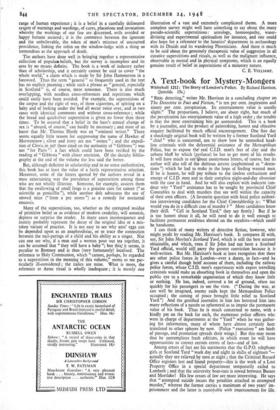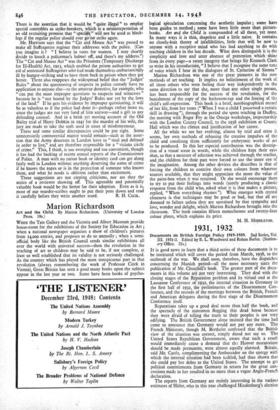A Text-book for Mystery-Mongers
Whitehall 1212: The Story of London's Police. By Richard Harrison. (Jarrolds. 15s.) " REAL detecting," writes Mr. Harrison in a concluding chapter on The Detective in Fact and Fiction, "is ten per cent. inspiration and ninety per cent. perspiration. Its entertainment value is usually slight." The proportions, I believe, are about right, but much of the perspiration has entertainment value of a high order ; the trouble is that the most entertaining bits go unrecorded. This is a book by a journalist, and the product of painstaking, honest and objective enquiry facilitated by much official encouragement. One fine day a shockingly original book will be written by a former Scotland Yard " chief " who is concerned, not to show how he unmasked head- line criminals with the 'deferential assistance of the Metropolitan Police, but to expose the real C.I.D. man's feet of clay and the urbane bluff by which (perforce) he has to get most of his results. It will have much to say 'about anonymous letters, of-course, but its author will also tell of the dubious arrests (euphemised as " deten- tions ") which he had to make in the hope of finding wanted men. If he is honest, he will pay tribute to the tireless enthusiasm and energy of C.I.D. men and to their complete night-and-day obsession with the case in hand. And he will also explain 'with indecent 'can- dour why " Yard " assistance has to be =sought by provincial Chief Constables to deal with murders that are well within the capacity of their own officers. (A favourite question with local police authori- ties interviewing candidates for the Chief Constableship is : " What would you do in a difficult case of murder ? " Most candidates know their drill. " Call in Scotland Yard," they say firmly.) But if he is too honest about it all, he will need to do it well enough to facilitate permanent residence abroad on the royalties—which could
be handsome. •
I can think of many writers of detective fiction, hoWever, who might profit by reading Mr. Harrison's book. It compares ill with, say, Sir John Moylan's Scotland Yard, which is still the best account obtainable, and which, even if Sir John had not been a Scotland Yard official, would still_earry the greater conviction because it is well-written. But Mr. Harrison's book at least recognises that there are other police forces in London—over a dozen, in fact—and he gives a careful though brief account of them, including the railway police forces, whose C.I.D. men's experiences with expert travelling criminals would make an absorbing book in themselves and open the public eye to a remarkable organisation of which they knoW .little or nothing. He has, indeed, covered a lot of ground, often too quickly for his passengers' to see the view. (" During the war, as can well be imagined, enemy raids kept the Metropolitan Police occupied ; the coming of peace brought little relief to Scotland Yard.") And the gratified journalist in him has betrayed him into many reflections of a natufe so ephemeral as to impair the permanent value of his book. Thus he is much concerned to name, with a kindly pat on the back for each, the numerous police officers who were in charge of 'departments at the " Yard " when he was gather- ing his information, many of whom have almost certainly beer translated to other spheres by now. (Police " executives " are birds of passage, and promotion spreads their wings.) But this may mean that he contemplates fresh editions, in which event he will have opportunities to correct certain errors of fact—and of law.
Among errors of fact are his statements that the G.P.O. telephone girls at Scotland Yard "work day and night in shifts of eighteen "-
actually they are relieved by men at night; the Criminal Record Office registers lost and found property—this is the work of a Lost Property Office in a special department temporarily exiled to Lambeth ; and that the university boat-race is rowed between Barnes and Mortlake ! His few errors of law are more interesting. He says that " attempted suicide incurs the penalties attached to attempted murder," whereas the former carries a maximum of two years' im- prisonment and the latter is nunishable with imprisonment for life. There is the assertion that it would be " quite illegal " to employ special constables as strike-breakers, which is a misinterpretation of an old recruiting promise that " specials" will not be used as black- legs if the regular police should ever go ton strike again.
Mr. Harrison says that the " Cat and Mouse Act " was passed to make all Suffragettes register their addresses with the police. (Can you imagine it ? " I believe in votes for women. I may shortly decide to knock a policeman's helmet off, and there's my address.") The " Cat and Mouse Act " was the Prisoners (Temporary Discharge for Ill-Health) Act, 1913, which enabled the prison authorities to get rid of sentenced Suffragettes who had made themselves embarrassingly ill by hunger-striking and to have them back in prison when they got better. There also reappears the widespread belief that the " Judges' Rules " about the questioning of suspects in police custody have no application to anyone else—to the amateur detective, for example, who " can put the most improper questions to suspects and witnesses " because he is "not bound by the Judges' Rules nor yet by the laws of the land." If he gets his evidence by improper questioning, it will be as valueless as if the police had done it—perhaps rather more so, since the judges are not very fond of him anyway—and a gift to any defending counsel: And in a brisk yet moving account of the Old Bailey trial of Harry Dobkin in 1941 for the murder of his wife, the jury are made to 'take the oath used in cases of misdemeanour.
These and some similar discrepancies could be put right. Some unnecessarily controversial matter would remain—such as the asser- tion that the Army deserters in London have to "steal and defraud in order to live," and are therefore responsible for a " vicious circle of crime." This, I think, is too sweeping and too convenient, though it has had the backing of recent annual reports of the Commissioner of Police. A man with no ration book or identity card can get along fairly well in London without anything deserving the name of crime if he knows the ropes or is in the protection of someone who knows them, and what he needs is oblivion rather than excitement.
These suggestions are not carping criticisms, nor are they the antics of a reviewer showing off. This agreeable and potentially valuable book would be the better for their adoption. Even as it is, most of our murder-scribes ought to put their pens down and read
it carefully before they write another word. R. H. CECIL.



































 Previous page
Previous page